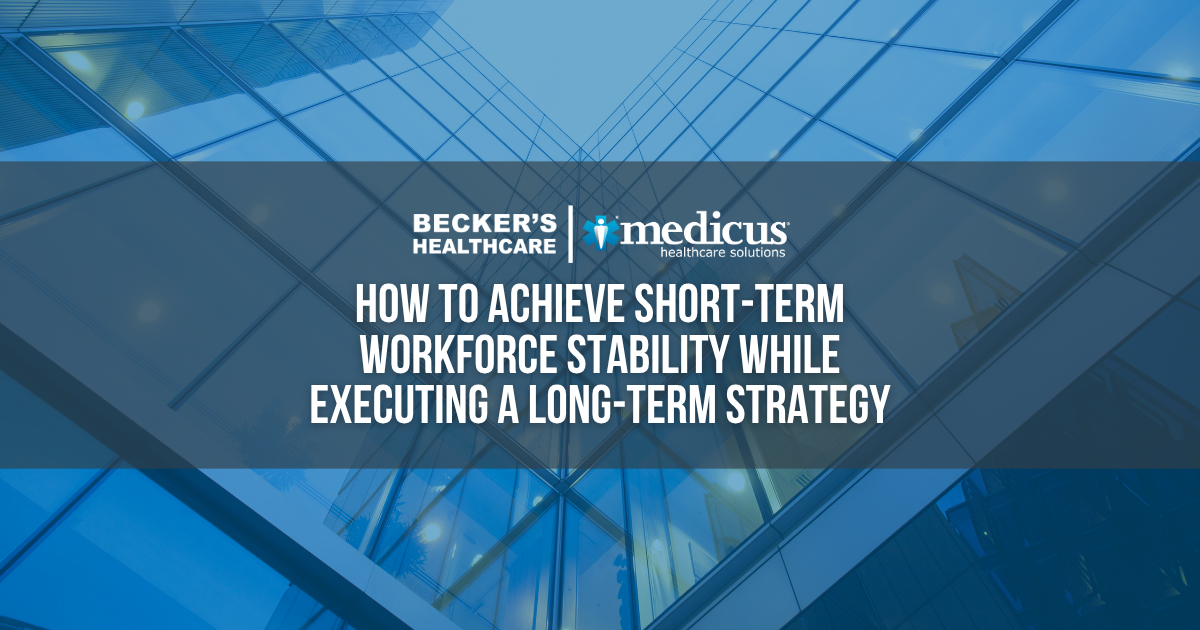Becker's Hospital Review: How Medicus is Seamlessly Bridging the Gap Between Outsourced and Employed Models

Becker's Hospital Review recently published an article about the Medicus Transition Program and its strategic approach to helping healthcare leaders move from an outsourced to an employed program. The article, titled 'Seamlessly Bridging the Gap Between Outsourced and Employed Models,' provides insights into how the Medicus Transition Program supports healthcare leaders making the shift to an employed healthcare staffing model while ensuring continuity of care.
Why Healthcare Leaders Are Moving to Employed Staffing Models
Growing demands for healthcare services, provider shortages, and rising burnout are driving many healthcare leaders to shift to employed staffing models. This transition offers several advantages, such as:
- Greater operational efficiency
- Predictable staffing costs
- Enhanced leadership oversight
- Stronger provider engagement
By bringing vital specialty programs in-house, healthcare leaders can achieve a variety of benefits, from creating a more cohesive, dependable team to greater operational efficiency and service offerings. However, the transition from outsourced to employed can be complex, with the process taking anywhere from 6 to 18 months. It requires healthcare leaders to manage coverage gaps, navigate administrative tasks, and more, all while ensuring patient care remains uninterrupted.
Key Insights Into How the Medicus Transition Program Can Ease the Shift
One innovative interim staffing strategy healthcare leaders are utilizing to ease the shift is the Medicus Transition Program. Designed to offer immediate, long-term locum tenens staffing solutions, the Medicus Transition Program supports healthcare leaders in achieving a seamless shift to an employed model. All while maintaining operational efficiency and adequate staffing levels.
The Medicus Transition Program does this by:
1. Maintaining Continuity of Care:
One of the main concerns healthcare leaders face during the transition from outsourced to employed is how to maintain uninterrupted access to care. The Medicus Transition Program addresses this need by providing immediate long-term locum tenens staffing coverage.
- Medicus can deploy a team of high-quality locum tenens providers.
2. Comprehensive Scheduling Support and Management:
Medicus supports healthcare leaders throughout the transition by handling every aspect of locum tenens scheduling. Plus, leaders have access to real-time reporting and analytics, staff spending, and more via Medicus' proprietary platform, MedicusIQ.
- Medicus co-manages schedules and facilities licensing, credentialing, onboarding, and orientation.
3. Improved Operational Efficiency and Expanded Service Offerings:
The Medicus Transition Program is designed to ensure healthcare facilities remain fully staffed, enabling healthcare leaders to manage increased patient volumes without disruption. In addition, with Medicus' help and adequate staffing coverage, leaders can even expand service offerings, enabling them to care for more patients in their community.
- Medicus can support the expansion of specialty-specific programs while permanent hires are being recruited.
4. End-to-End Solutions for Long-Term Success:
Medicus remains a committed partner until the healthcare facility has reached clinical workforce stabilization. For facilities struggling to find high-quality providers, Medicus has a partnership with Optimum Permanent Placement.
- Optimum can help healthcare facilities secure top-tier providers to meet their long-term healthcare staffing goals.
The Medicus Transition Program serves as a trusted partner in navigating the shift from an outsourced to an employed healthcare staffing model. By providing an interim staffing solution with immediate locum tenens coverage and supporting healthcare leaders' long-term staffing goals, Medicus ensures leaders can confidently make the shift without compromising patient care or operational efficiency.
Looking to make the Transition? Complete the short form below to connect with Medicus.


-1.jpg)